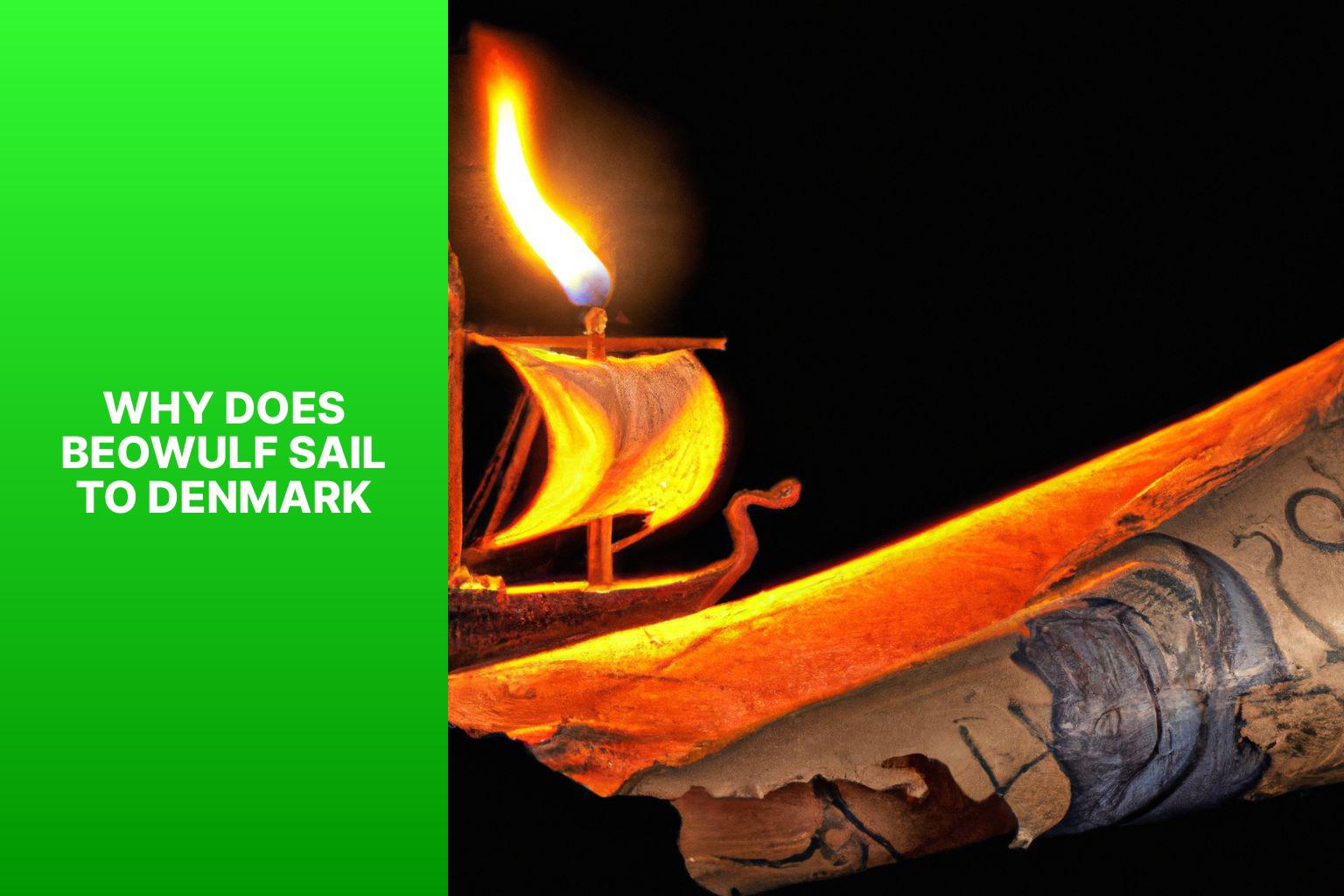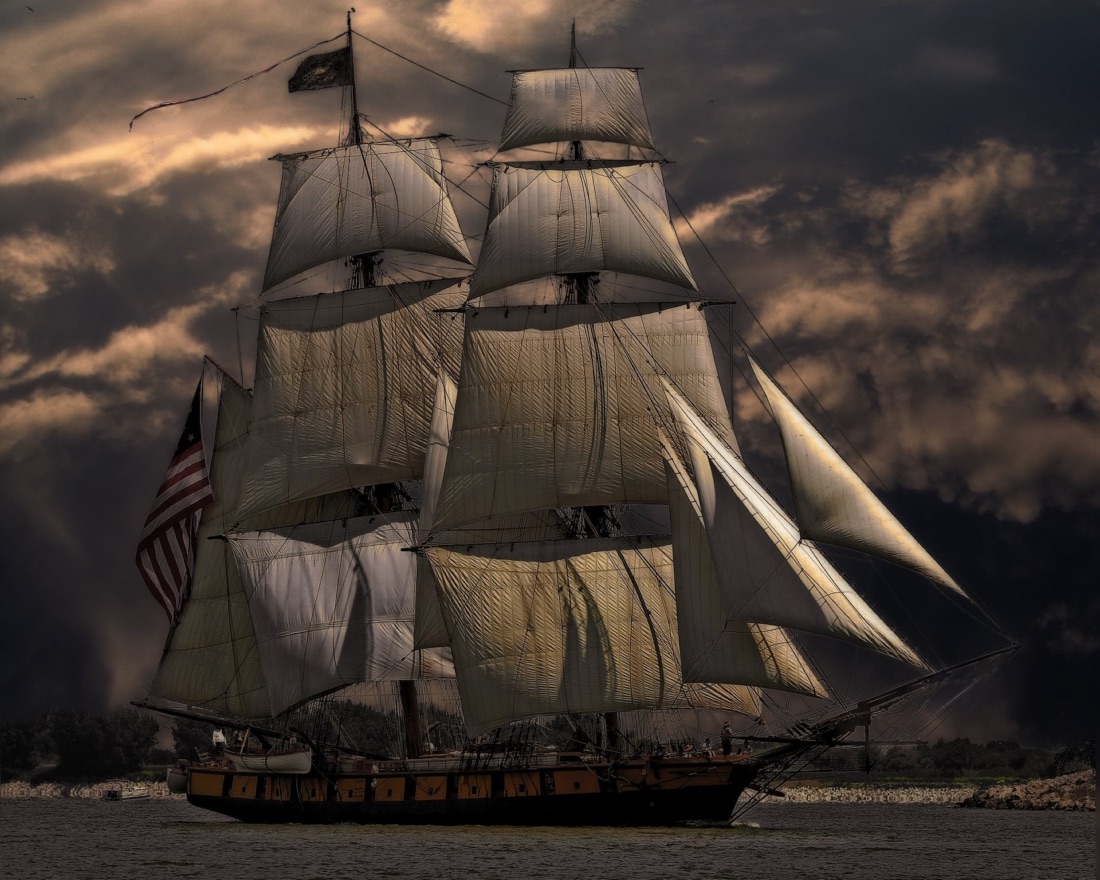Beowulf, the legendary hero of Old English literature, embarks on a significant voyage to Denmark in the epic poem Beowulf. This article explores the reasons behind Beowulf’s decision to sail to Denmark, his journey and arrival, as well as the significance of this heroic quest.
To fully understand the context, we will delve into the historical and literary background of Beowulf, examining the setting of Scandinavia in the Early Middle Ages and the authorship of the epic poem.
The primary reasons for Beowulf’s voyage to Denmark include the call for aid from Hrothgar, the ruler of the Danes, and the need to confront and defeat the fearsome monster, Grendel. Beowulf’s journey is filled with perils and challenges, which we will explore, and ultimately culminates in his arrival on the shores of Denmark.
This voyage holds great significance as it demonstrates the courage and heroic nature of Beowulf. It establishes alliances, showcases his strength and valor, and allows him to engage in heroic feats.
Key takeaway:
- Beowulf’s voyage to Denmark demonstrates his courage and heroic nature: Beowulf responds to Hrothgar’s call for aid, facing the threat of Grendel and proving his heroism in battling the monster.
- Beowulf’s journey to Denmark establishes alliances and engagements in heroic feats: His voyage not only helps Hrothgar against Grendel but also showcases his abilities, earning him reputation and respect.
- Beowulf’s legacy and impact: His voyage to Denmark contributes to his enduring legacy as a renowned hero and illustrates the significance of his actions in both historical and literary contexts.
Historical and Literary Context of Beowulf
Unraveling the historical and literary context of Beowulf, we embark on a journey through time and words. Delving into the setting of Scandinavia in the Early Middle Ages, we discover the backdrop against which heroic tales unfolded. Exploring the epic poem, Beowulf, and its mysterious authorship, we unlock the enigmatic origins of this legendary masterpiece. We seek to uncover the reasons that propelled Beowulf on his courageous voyage to Denmark. Brace yourself for a captivating exploration of Beowulf’s world, where history and literature intertwine in a gripping tapestry.
The Setting: Scandinavia in the Early Middle Ages
Scandinavia in the Early Middle Ages, encompassing modern-day Denmark, Norway, and Sweden, served as the backdrop for the epic poem Beowulf.
The time period in Scandinavia ranged from the 5th to the 10th century AD and was characterized by fjords, dense forests, and a cold climate that greatly influenced the lives and culture of its inhabitants.
During this era, Scandinavia was inhabited by various Germanic tribes such as the Danes, Swedes, and Geats, each with their own distinct languages, customs, and social structures.
The majority of people in the region were engaged in farming and animal husbandry. Additionally, trade and raiding expeditions played significant roles in both the economy and politics of the area.
The Early Middle Ages in Scandinavia witnessed the development of a vibrant oral tradition, from which the legendary tale of Beowulf emerged.
This poem encapsulates the values and ideals of the time, highlighting heroic deeds, loyalty, and honor.
To fully grasp the setting of Beowulf and fully immerse oneself in the poem’s world, it is recommended to explore the history and culture of Scandinavia during the Early Middle Ages.
Discovering the customs and beliefs of the Germanic tribes, as well as their interactions with other cultures through trade and conflict, will provide a deeper understanding of this captivating era.
The Epic Poem: Beowulf and its Authorship
The epic poem Beowulf and its authorship are both significant topics in literature that have captured the attention of scholars. It is believed to have been written by an unknown author, possibly a scop or poet, during the early Middle Ages. The authorship of Beowulf remains uncertain, but it is widely recognized as one of the most important works in Old English.
Beowulf narrates the tale of a brave warrior who embarks on a perilous quest to vanquish the monstrous Grendel and his mother. The poem showcases Beowulf’s heroic deeds and delves into themes of heroism, loyalty, and the eternal struggle between good and evil.
The author of Beowulf expertly intertwines elements of Germanic mythology, Scandinavian history, and Christian influences to create a narrative that is both intricate and captivating. The poem follows a highly structured format with alliteration and employs vivid imagery to bring the characters and events to life.
The historical context of Beowulf is of great significance as it offers valuable insights into the culture, values, and beliefs of the time. It provides a glimpse into the warrior society of Scandinavia and reflects the paramount importance of honor, glory, and kinship in the lives of the characters.
The epic poem Beowulf and its authorship continue to enthrall readers and engage scholars alike. Its enduring legacy lies in its exploration of timeless themes and its contributions to the realm of English literature. The author’s exceptional skill in crafting this remarkable work has solidified its position as a true masterpiece in the world of epic poetry.
Reasons for Beowulf’s Voyage to Denmark
- Beowulf voyaged to Denmark because King Hrothgar requested his assistance. Hrothgar was facing attacks from the monstrous Grendel and was in great distress. He needed courageous warriors to aid him.
- Beowulf’s desire to prove his heroism and bravery led him to confront the formidable adversary Grendel. He believed that defeating Grendel would bring him recognition, respect, and establish his reputation as a legendary figure.
Beowulf‘s strong sense of duty, honor, and his determination to protect innocent people from Grendel‘s terror compelled him to embark on the voyage to Denmark.
The Call for Aid from Hrothgar
Hrothgar, the king of the Danes, faced a grave threat from the monster Grendel. He urgently issued a call for aid from warriors far and wide. Beowulf, known for his remarkable courage and strength, promptly responded to Hrothgar’s plea. Being fully aware of the importance of safeguarding the innocent, Beowulf saw this as an opportunity to demonstrate his valor and bravery by directly confronting Grendel.
Upon his arrival in Denmark, Beowulf was warmly received by Hrothgar and his loyal men. Not only did Beowulf’s presence rescue the Danes from their perilous situation, but it also forged a deep bond between them. The Danes acknowledged Beowulf’s exceptional bravery and expressed their immense gratitude for his unwavering determination to confront the terrifying monster that plagued their land.
Furthermore, Hrothgar’s call for aid carried wider implications. It shed light on the crucial significance of forming alliances and fostering a strong sense of community in overcoming the challenges that arise in times of adversity. By bravely defending the Danes, Beowulf not only garnered their respect and admiration, but also demonstrated through his heroic deeds the immense power of unity and human resilience in the face of seemingly insurmountable hardships.
A similar call for aid was witnessed during the devastating Hurricane Katrina in 2005. Brave individuals fearlessly responded to the call, risking their own lives in order to save and support others in need. Their selflessness and unwavering courage unequivocally showcased the profound impact of collective action and human strength when individuals come together to help those facing dire circumstances. Hrothgar’s call for aid continues to serve as a timeless and poignant reminder of the incredible difference individuals can make when united in their efforts to assist those who are in desperate need.
The Threat of Grendel and Proving his Heroism
Grendel presented a significant threat to the people of Denmark, and Beowulf saw this as his chance to prove his heroism. Beowulf embarked on a mission to confront Grendel and safeguard Hrothgar’s kingdom. For twelve long years, Grendel instilled terror in the Danish warriors, taking numerous lives and instilling immense fear in the population. Beowulf believed it was his responsibility to put an end to Grendel’s reign of terror and bring peace to the land.
Beowulf’s actions were motivated by his longing to demonstrate himself as a heroic figure. Defeating Grendel would not only rescue the kingdom but also establish Beowulf’s reputation as a bold and mighty warrior. This challenge provided Beowulf with an opportunity to exhibit his strength, skill, and bravery.
In taking on Grendel, Beowulf showcased his determination and willingness to risk his life for the greater good. His actions were not solely driven by a quest for personal glory but also by a sense of duty towards his fellow warriors and the people of Denmark. Beowulf’s heroic endeavors exemplified his leadership qualities and his unwavering commitment to protect and serve his people.
Beowulf’s Journey and Arrival in Denmark
Embarking on a treacherous sea journey, Beowulf faces a series of perils and challenges that test his strength and determination. Join us as we delve into the gripping account of his adventure, culminating in his long-awaited arrival on the shores of Denmark. Brace yourself for a tale of courage and heroism, as we uncover the gripping details of Beowulf’s journey and his fateful arrival in Denmark. Get ready to be swept away by this legendary saga!
The Perils and Challenges Faced during the Sea Journey
Beowulf encountered a multitude of perils and challenges throughout his perilous sea voyage to Denmark. The treacherous nature of the waters, characterized by violent storms and unpredictable tides, posed a constant threat to the safety of the crew. The task of navigating through hazardous reefs and rocky shores brought the looming danger of shipwreck and loss of life. The vast expanse of the open sea presented a formidable challenge, as it lacked recognizable landmarks or clear directions for navigation.
The crew found themselves face to face with menacing sea creatures, including colossal sea serpents and whales capable of attacking and capsizing the vessel. Therefore, it was imperative for them to remain ever-vigilant and ready to defend themselves against these formidable adversaries.
The issue of supplies and provisions loomed large, given the limited resources available. Consequently, the crew had to meticulously plan and ration their food and fresh water supplies to ensure their sustenance throughout the entire voyage.
In spite of all these daunting challenges, Beowulf and his steadfast crew displayed tremendous courage and unwavering determination, prevailing against all odds encountered along their arduous journey. Their achievements served as a testament to Beowulf’s exceptional leadership skills and the unwavering strength exhibited by his loyal companions.
Pro-tip: Prior to embarking on a sea journey, it is crucial to ensure the vessel is well-maintained, the crew consists of experienced sailors, and sufficient provisions are carried on board. Maintaining a constant state of vigilance and preparedness is essential to effectively confront any obstacles that may arise during the course of the voyage.
Reaching the Shores of Denmark
Upon reaching Denmark and standing on the shores of the foreign land he had set out to reach, Beowulf felt a mix of anticipation and trepidation. The long sea journey had finally ended, marking a significant moment in his life.
Ready to fulfill his mission and embark on his heroic exploits in the land of the Danes, Beowulf embraced the challenges that the journey to Denmark had presented. Standing on the shores gave him a sense of accomplishment, replacing the uncertainty of the voyage with a newfound sense of purpose and determination.
Taking his first steps on the shores of Denmark, Beowulf knew that he had a monumental task ahead of him. The awaited confrontation with Grendel, the monster terrorizing Hrothgar and his people, would test his worth as a hero. Beowulf was determined to face this threat head-on and prove himself.
The act of reaching Denmark went beyond being a mere physical milestone for Beowulf. It was also a symbolic moment, marking the beginning of his alliance with Hrothgar and the start of his heroic feats in a foreign land. Beowulf‘s voyage would leave a lasting legacy, forever etching his name in the annals of heroism.
The Significance of Beowulf’s Voyage
Embarking on a treacherous journey to Denmark, Beowulf’s voyage holds great significance in shaping the heroic narrative. As we delve into this section, we’ll witness the demonstration of his unwavering courage and heroic nature. We’ll uncover the strategic importance of establishing alliances and engaging in heroic feats, painting a vivid picture of Beowulf’s daring adventure. Get ready to be swept up in a tale of bravery, alliances, and the pursuit of glory.
Demonstrating Beowulf’s Courage and Heroic Nature
Beowulf’s courage and heroic nature are vividly demonstrated in his fearless voyage to Denmark. He fearlessly sets sail, bravely braving treacherous seas and battling fierce storms. His unwavering determination and resilience vividly showcase his indomitable bravery.
Upon reaching Denmark, Beowulf fearlessly confronts the mighty monster Grendel, who has been terrorizing Hrothgar’s kingdom. Beowulf’s exceptional strength and unwavering courage enable him to overpower Grendel, emerging as the victorious hero. His valiant actions not only save the Danes but also establish him as a legendary figure, revered for his heroic deeds.
Beowulf’s perilous voyage exemplifies his outstanding heroic character and his unyielding willingness to stand up against evil. His unparalleled courage becomes a source of inspiration for others, solidifying the alliance between Geatland and Denmark.
Similarly, historical figures such as King Leonidas of Sparta have also demonstrated exceptional courage and heroism. During the Battle of Thermopylae in 480 BC, King Leonidas fearlessly led a small army of 300 Spartans against a massive Persian force. Their unwavering bravery and determination showcased their noble and courageous nature.
Through the ages, demonstrating courage and heroism has remained a recurring theme in history. These exceptional individuals inspire us and serve as a reminder of the extraordinary power of human bravery.
Establishing Alliance and Engaging in Heroic Feats
Beowulf demonstrates his prowess and courage while solidifying his position as a formidable warrior by establishing alliances and engaging in heroic feats during his voyage to Denmark. By forming alliances with Hrothgar and his people, Beowulf strengthens the bond between their kingdoms, establishing a sense of unity and camaraderie among his fellow warriors. These shared experiences on the battlefield contribute to the foundation for future collaborations in times of need, fostering trust and reliance among the warriors.
Beowulf’s engagement in heroic feats serves multiple purposes; it not only showcases his extraordinary abilities and heroic nature to the people of Denmark, solidifying his reputation as a legendary warrior, but also highlights his worthiness as a hero who can protect and defend the realm. Triumphing over adversaries like Grendel and his mother, Beowulf proves his valor and demonstrates his ability to overcome great challenges. The victories achieved by Beowulf and his fellow warriors instill pride and confidence in their abilities, fostering a sense of pride and confidence within the kingdom.
Some Facts About Why Beowulf Sails To Denmark:
- ✅ Beowulf sails to Denmark to come to the aid of King Hrothgar and his people who are being attacked by the monster Grendel. (Source: custom-writing.org)
- ✅ Beowulf’s decision to undertake the risky affair in sailing to Denmark was driven by loyalty, as Hrothgar had helped his father in the past by settling a feud. (Source: custom-writing.org)
- ✅ Beowulf was ambitious and wanted to increase his fame as a hero who defeated sea monsters, and his success in battling Grendel and his mother would bring glory to his king, Hygelac. (Source: custom-writing.org)
- ✅ Beowulf wanted to help Hrothgar defeat Grendel and gain more fame and glory, as Hrothgar had helped Beowulf’s father in the past. (Source: microblife.in)
- ✅ Beowulf travels to the land of the Danes because Grendel has been terrorizing and killing the Danes for twelve years. (Source: microblife.in)
Frequently Asked Questions
Why does Beowulf sail to Denmark?
Beowulf sails to Denmark to come to the aid of King Hrothgar and his people, who are being attacked by the monster Grendel. His motives for sailing to Denmark are complex. First, he is a young warrior eager to earn glory and enhance his reputation. Second, he is on a lifelong quest for honor, as only through fame and honor can a warrior hope to gain a measure of immortality.
What role does loyalty play in Beowulf’s decision to sail to Denmark?
Beowulf’s decision to undertake the risky affair of fighting the man-eating monster in Denmark was driven by loyalty. Hrothgar had helped his father in the past by paying a blood-money to settle a feud. If Hrothgar had not paid, Beowulf’s family would have been exiled and their property confiscated.
Why does Beowulf want to increase his fame as a hero?
Beowulf is ambitious and wants to increase his fame as a hero who defeated sea monsters. His success in battling Grendel and his mother would also bring glory to his king, Hygelac.
What challenges does the voyage to Denmark present to Beowulf?
The voyage to the land of the Danes is long and dangerous, providing an exciting challenge for Beowulf to prove his skills once again. It is a hazardous voyage that tests his bravery and endurance.
How does Beowulf establish his identity in Denmark?
Beowulf establishes his identity in Denmark by offering his services to King Hrothgar and his people. He proves himself as a formidable warrior by defeating the hideous monster Grendel and his mother.
What is the difference between a good warrior and a good king in the poem Beowulf?
The poem Beowulf explores the difference between a good warrior and a good king. While Beowulf excels as a warrior, he also aspires to be a good king who protects his people. This tension between the heroic code of warrior conduct and the responsibilities of leadership is a major theme in the poem.





Leave a Reply